An HIT Moment with … Brian Beutner
An HIT Moment with ... is a quick interview with someone we find interesting. Brian Beutner is CEO of mPay Gateway.
Are patients really happy about having to arrange payment before they leave the doctor’s office like they would a hotel or restaurant, especially since they don’t know how much will be charged on their credit card until the practice receives the remittance advice from their insurer?
The transparency that we help bring to the doctor-patient financial transaction is something that most patients appreciate. Since we are only collecting authorization at the time of service and because the amount ultimately charged against the patient’s credit card is never more than what is shown to the patient at the time they hand over their card, we find that most patients like it. They like the fact that there are no more unpleasant surprises and the simplicity of taking care of the payment up front, rather than having to wade through numerous statements from the doctor and comparing them to the multiple EOBs and other confusing insurance documents.
We also find that many patients take comfort in the certainty of knowing they will owe no more than the calculated amount. With mPay Gateway, they walk out of the doctor’s office with an itemized receipt and the confidence that they have taken care of their obligation and won’t be surprised later with a larger than expected bill.
I use my wife as an example. This winter, we took our daughter to an allergist. A month or two later, my wife said, “We got the bill from the allergist. It was only $89.” It didn’t hit me until later that evening the relief I heard in my wife’s voice. For the past month or two, she had been worrying about how much that trip to the allergist was going to cost. We had no idea whether it was going to be $100 or $1,000. If we had left the office knowing that the most the doctor was going to charge our credit card was $100, it would have avoided two months’ of needless worry.
The ultimate proof is in the use. When our clients show the patient the most that they will owe and ask for a payment card, more than 90 percent of the time, the patient will hand over a card and conclude the visit.
What are the requirements to use mPay Gateway, how is it implemented, what does it cost, and who does it compete with?
Starting to use mPay Gateway is simple. It works with any computer that has an Internet connection. We provide a cell phone-sized magnetic card swipe device that plugs into any USB port. Because all the financial data is resident on our Level 1 PCI DSS-certified servers, the information is secure.
Our implementation specialists work with our clients to quickly set up the patient payment calculator using the doctor’s own rates and discounts with health plans. With just a few hours of Web-based training for both the staff speaking with patients and the back office staff, the office can be up and running mPay Gateway’s solutions. Once implemented physicians offices can see their receivables drop by 50 percent or more in a matter of weeks.
We charge a monthly license fee to make the service available and cover all costs of getting started on the system. We pass through standard payment card processing charges from VISA and MasterCard, and add a small collection fee on incremental dollars collected through the system.
The biggest competition we see are old, outdated processes that are not very patient friendly. Standard payment processing technology does not handle the unique environment of health care, where the exact amount a patient may owe is not known at the time of service. However, physician practices recognize how difficult it is to collect from patients months after the insurance company settles, so they often use revenue cycle management solutions that leverage outdated technology, resulting in processes that are not very patient friendly.
Typically what we see, if anything, is a process where the practice calculates a patient estimate at the time of service, and then attempts to get the patient to pay on the spot. Not only does this typically frustrate the patient who knows that his or her insurer will pay all or part of the charges, but it creates a second reconciliation when the claim is adjudicated and the staff must reimburse the patient.
Instead, mPay Gateway developed a solution that uses modern software as a service technology to enable practices to resolve patient payments at the point of service, but doesn’t charge the patient until the claim is settled with the provider. The mPay Gateway system runs only one transaction, the right one, making it clear to the patient and easy for the staff.
What will payments to physicians look like in five years in terms of who pays and how?
I believe that we will continue to see cost shifting to the consumer, so that an increasing share of a physician’s revenue will come directly from patients. Much like what the insurers have done, we will see increased use of electronic payments. Five years ago, insurers were making most of their payments to providers by paper check in the mail — hundreds of millions of checks every year. Now much of the payments from insurers are sent electronically to physicians.
A service like mPay Gateway allows physicians to collect authorization from patients electronically at the point of service (rather than by paper check weeks later), much like how the rest of the economy works.
You used to work with high deductible health plans and health savings accounts. Are those going to be more or less important going forward?
I cannot predict what the next alphabet soup of plan design will be, but I am certain that we will continue to see more patient involvement in the financing of health care. The good news is that almost all health care transactions — especially those in the physician office — are for relatively small dollar amounts. Fortunately, the retail industry has long ago solved how to make the payments of small consumer transactions very efficient. mPay Gateway is building on that foundation to bring retail payment transaction efficiencies to health care. Without being dependent on any particular card or plan type, we add transparency and reduce the administrative inefficiencies in the health care payment systems of today.
How does the prospect of healthcare reform impact your business?
The current debate about health care reform is focused primarily on extending insurance coverage to the 47 million people who currently must make direct arrangements to pay for the care they seek. As we add more people to the insurance roles, the complexity increases. Our business is built upon helping physicians deal with insurers that stand between the patient and the physicians.
In general, practices can deal with those who do not have insurance by requiring payment up front. As more people without insurance coverage obtain third-party coverage, the burden on physician practices will increase. Currently physician practices write off as much as $30 billion in bad debt each year, mostly attributable to patients with insurance coverage. Since any plan to increase insurance coverage will require some degree of patient payment responsibility (like a deductible or co-insurance), this problem will only get worse.
We see health care reform as a great growth opportunity for us as we bring cost savings to physicians with a product specifically tailored to dealing with third-party insurers.


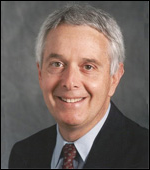
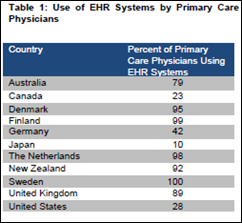
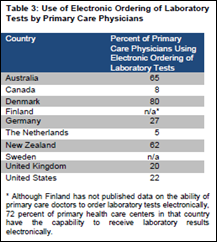
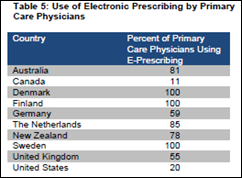

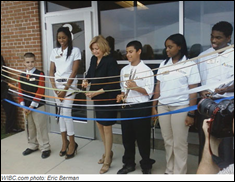




The article about Pediatric Associates in CA has a nugget with a potentially outsized impact: the implication that VFC vaccines…